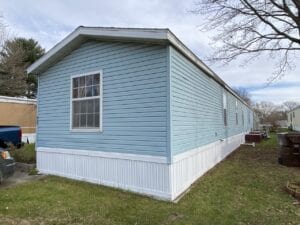If you inherited a mobile home it can be both a blessing and a challenge? Inherited mobile homes, also known as manufactured homes, carry unique significance in the world of real estate. From unexpected windfalls to emotional ties, there are various scenarios that lead individuals to inherit these dwellings. However, before diving into the possibilities, it is crucial to grasp the legal aspects surrounding inheritance.

Inherited a Mobile Home
Understanding the ins and outs of inherited mobile homes is essential for navigating this complex terrain. From deciphering local regulations to comprehending zoning restrictions, being well-versed in the legalities ensures a smoother process. So whether you’ve recently become an heir or are simply curious about this intriguing sector of housing, join us as we explore the fascinating world of inherited mobile homes.
Inherited mobile homes have their own set of rules and challenges; let’s unravel them together.
What to Do with an Inherited Mobile Home: Your 3 Options
Option 1: Sell Your Inherited Mobile Home (Most Popular)
If you don’t want to manage the property, selling is often the best choice. You can:
– Get cash offers from mobile home buyers
– List with a real estate agent
– Sell to investors
Option 2: Keep and Live In It
Consider if the location works for your lifestyle and if you can afford lot rent or maintenance.
Option 3: Rent It Out
Generate rental income, but check park rules first – many don’t allow rentals.
Understanding the Estate Settlement Process for Inherited Mobile Homes
Inheriting a mobile home can be both a blessing and a challenge. While it may come with sentimental value or serve as an additional asset, the estate settlement process for inherited mobile homes can be complex. This article will provide an overview of the estate settlement process for inherited mobile homes, highlighting the role of probate and addressing potential challenges that may arise.
When someone passes away and leaves behind a mobile home, their estate must go through a legal procedure known as probate. Probate is necessary to validate the deceased person’s will, settle outstanding debts, distribute assets among beneficiaries, and ultimately transfer ownership of the inherited mobile home.
Inherited a Mobile Home: Probate
During probate, the court appoints an executor or personal representative who oversees the entire estate settlement process. This individual is responsible for identifying all assets within the estate, including the inherited mobile home. They must ensure that proper documentation is filed with the court and manage any outstanding financial obligations such as taxes or debts related to the property.
Role of Probate in Settling an Estate with a Mobile Home
Probate plays a crucial role in resolving any disputes or claims against an inherited mobile home. It provides a structured framework for distributing assets fairly among beneficiaries while adhering to state laws and regulations.
One important aspect of probate is determining whether there is a valid will in place. If there is no will or if it is deemed invalid, state laws governing intestacy will dictate how the inheritance should be distributed. This can sometimes lead to complications if multiple heirs are involved or if there are conflicting claims over ownership.
To ensure a smooth settlement process, it is essential to gather all relevant documents pertaining to the inherited mobile home. These may include title deeds, insurance policies, maintenance records, and any other paperwork that establishes ownership and outlines its condition.
Potential Challenges and Complexities Involved in Estate Settlement
Settling an estate with an inherited mobile home can present unique challenges. Here are some potential complexities that may arise during the process:
Title issues: Ensuring a clear title is crucial, as any liens or unresolved ownership disputes can hinder the transfer of ownership. It is essential to conduct a thorough title search and resolve any outstanding issues before proceeding.
Property maintenance: Inherited mobile homes may require repairs or upgrades to increase their value or make them marketable for sale. The executor should assess the property’s condition and determine if any improvements are necessary.
- Tax implications: Depending on the jurisdiction, inheriting a mobile home may have tax consequences. It is advisable to consult with a tax professional to understand any potential tax liabilities associated with the inherited property.
Emotional attachments: Inherited mobile homes often hold sentimental value for family members, which can complicate decision-making during the settlement process. Balancing emotional considerations with practicality is essential to ensure a fair distribution of assets.
Navigating through these challenges requires careful planning, open communication among beneficiaries, and professional guidance when needed.

Quick Decision Guide: Should You Sell Your Inherited Mobile Home?
✓ Sell if:**
– You don’t want to move there
– Lot rent is expensive
– Home needs major repairs
– You need immediate cash
**✓ Keep if:**
– Location works for you
– Home is in good condition
– Lot rent is affordable
– Sentimental value is important
Requirements and Steps to Transfer a Mobile Home Title after the Owner’s Death
Key requirements for transferring a mobile home title after owner’s death
Transferring ownership of an inherited mobile home requires fulfilling certain requirements. First and foremost, you will need the death certificate of the previous owner. This document serves as proof of their passing and is crucial for initiating the transfer process. It is essential to gather all relevant documents related to the mobile home, such as its original title, any outstanding liens or mortgages, and any legal documentation establishing your status as the rightful heir.
Step-by-step process for transferring ownership: inherited a mobile home
Gather necessary documents: Begin by collecting all required paperwork, including the death certificate, original title, and any other relevant legal documentation.
Contact local authorities: Get in touch with your local Department of Motor Vehicles (DMV) or equivalent agency responsible for handling mobile home titles. Inquire about their specific procedures and requirements for transferring ownership after the owner’s death.
Complete necessary forms: Fill out any forms provided by the DMV or other governing body accurately and completely. These forms typically require information about both the deceased owner and yourself as the inheritor.
Provide supporting documentation: Alongside completed forms, submit supporting documents such as the death certificate, original title, and any additional paperwork requested by the DMV.
Pay applicable fees: Be prepared to pay any fees associated with transferring ownership of a mobile home title. These fees may vary depending on your location but are generally reasonable.
Wait for processing: After submitting all required documents and paying fees, patiently await processing by the DMV or relevant authority overseeing mobile home transfers in your area.
Receive new title: Once approved, you will receive a new title reflecting your ownership of the inherited mobile home.
Documentation Needed to Complete the Title Transfer Successfully
To ensure a successful transfer of the mobile home title, you must gather and provide specific documentation. The following documents are typically required:
Death certificate: This official document serves as proof of the previous owner’s passing and is crucial for initiating the transfer process.
Original title: The original title of the mobile home establishes legal ownership and must be presented during the transfer process.
Legal documentation: Any legal paperwork establishing your status as the rightful heir should be provided to support your claim to ownership.
Additional paperwork: Depending on local regulations, you may need to provide additional documentation such as a will or probate court order. Check with your local DMV or relevant authority for specific requirements.
By ensuring you have all necessary documentation in order, you can expedite the title transfer process and avoid unnecessary delays or complications.

You might also be interested in our article:
Selling a Parents House
Inherited a Mobile Home: Exploring Options and Rights of Heirs for Occupied
Inheriting an occupied mobile home can present heirs with a range of rights and options to consider. Whether it’s continuing or terminating tenancy agreements, understanding the legal protections provided, or navigating the complexities of estate planning, there are important factors to keep in mind as new owners take on this unique form of real estate.
Rights and options available to heirs when inheriting an occupied mobile home
As an heir, you have certain rights and options. Understanding these can help you make informed decisions about how to proceed:
Continuing tenancy: One option available is to allow the current occupant(s) to continue residing in the mobile home. This may be particularly relevant if they were a surviving spouse or had a legal right to live there.
Terminating tenancy: Alternatively, you may decide to terminate the existing tenancy agreement and take possession of the property yourself or explore other possibilities such as selling it.
Negotiating new terms: It is also possible to negotiate new rental terms with the current occupants if both parties are interested in maintaining a landlord-tenant relationship.
Considerations For Continuing or Terminating Tenancy Agreements
When deciding whether to continue or terminate a tenancy agreement for an inherited mobile home, several considerations come into play:
Personal circumstances: Assess your own needs and financial situation before making any decisions. Consider whether you require the residence for personal use, rental income, or if selling would be more beneficial.
Property condition: Evaluate the condition of the mobile home and determine if any repairs or renovations are necessary before continuing with occupancy agreements.
Communication: Openly communicate with the current occupants about their intentions and preferences regarding continued tenancy or termination.
Legal obligations: Familiarize yourself with local laws and regulations governing mobile home tenancy agreements to ensure compliance when making decisions.
Legal protections provided to heirs in occupied inherited mobile homes
Inherited mobile homes often come with legal protections for the heirs. Understanding these rights can help you navigate the process more effectively:
Succession laws: In some jurisdictions, specific succession laws may govern the transfer of ownership and tenancy rights for inherited mobile homes. Consult an attorney or legal expert well-versed in real estate and succession matters to understand your rights fully.
Court involvement: If disputes arise between heirs or occupants, it may be necessary to involve the court system to resolve conflicts and determine rightful ownership.
Executor responsibilities: Executors of an estate have a duty to manage assets, including inherited mobile homes, in accordance with the wishes outlined in the will or trust document.
Legal advice: Seek guidance from an experienced attorney specializing in real estate law or estate planning to ensure you are aware of all your rights as an heir.
Navigating the world of inherited mobile homes requires careful consideration of various factors such as personal circumstances, property condition, and legal obligations. By understanding your options and seeking professional advice when needed, you can make informed decisions that align with your goals as a new owner of an inherited mobile home.
Key Considerations: Mobile Home Titles and Transfer Procedures
One of the key considerations is understanding the process of transferring the title. Verifying the status and condition of the mobile home title is crucial to ensure a smooth transfer procedure. However, several factors can influence this process, including location and state regulations.
Importance of verifying the status and condition of the mobile home title
Before initiating any transfer procedures for an inherited mobile home, it is essential to verify the status and condition of its title. This step ensures that you have legal ownership rights over the property and helps prevent any future disputes or complications. To complete this verification successfully, consider following these guidelines:
Gather all relevant documents: Collect any paperwork related to the mobile home, such as purchase agreements, bills of sale, or previous titles.
Contact local authorities: Reach out to your local Department of Motor Vehicles (DMV) or similar agency responsible for titling vehicles in your area. They can provide information on how to proceed with verifying the title’s status.
Perform a title search: Engage professional services or conduct an online search to determine if there are any liens or encumbrances on the mobile home’s title.
Consult legal professionals: If you encounter complex situations during your verification process, seek advice from attorneys specializing in real estate law or mobile homes.
Factors influencing transfer procedures
Transfer procedures for inherited mobile homes can vary based on location and state regulations. Understanding these factors is crucial when navigating through the titling process smoothly:
State-specific requirements: Each state has its own set of regulations governing manufactured home titles and transfers. Familiarize yourself with your state’s guidelines by visiting their official websites or contacting relevant authorities.
Titling fees: Be prepared for potential fees associated with transferring the mobile home title. These fees can vary depending on the state and may include application charges, taxes, or additional administrative costs.
Timeframes: The duration of the transfer process can vary from case to case. Factors such as paperwork completion, government processing times, and any potential complications can influence how long it takes to finalize the title transfer.
Change of ownership: During the transfer process, ensure that all necessary documents reflect the change in ownership accurately. This includes updating names on titles, registrations, and insurance policies.
Navigating potential complications during the title transfer process
The title transfer process for an inherited mobile home can sometimes be complex and may involve unexpected challenges. Here are some tips to help you navigate potential complications:
Seek professional assistance: If you encounter difficulties or have questions during the titling process, consider consulting professionals who specialize in mobile home transfers or real estate law.
Stay organized: Keep all relevant documents in a secure location and maintain detailed records of your interactions with authorities or professionals involved in the transfer process.
Follow guidelines diligently: Adhere to state-specific guidelines meticulously to avoid delays or rejections during the titling procedure.
Communicate effectively: Maintain open lines of communication with all parties involved in the title transfer, including government agencies, attorneys, and insurance providers.
Inherited a Mobile Home: Probate Process without Wills
Inheriting a mobile home can be a complex process, especially when there is no valid will in place. The absence of a will adds an additional layer of complexity.
Overview of Probate Process for Inherited Mobile Homes without Wills
Probate is the legal process through which the assets and debts of a deceased person are distributed and settled. When someone passes away without leaving a valid will behind, their estate enters intestacy. This means that state laws dictate how the assets are distributed among heirs.
The probate process involves several steps. First, the court appoints an administrator to oversee the proceedings. The administrator acts as a personal representative and has various responsibilities, such as locating all assets, paying off debts and taxes, and distributing remaining assets among heirs according to state laws.
Role of Court-Appointed Administrators in Managing Inheritance Proceedings: Inherited a Mobile Home
Court-appointed administrators play a crucial role in managing inheritance proceedings for inherited mobile homes without wills. They act as impartial representatives who ensure that all legal requirements are met throughout the probate process.

Inherited a Mobile Home: Courts
The responsibilities of court-appointed administrators include:
Identifying Assets: Administrators must identify all assets belonging to the deceased individual’s estate, including the inherited mobile home.
Valuing Assets: Accurate valuation of assets is essential for determining their fair distribution among heirs.
Paying Debts and Taxes: Administrators must settle any outstanding debts or taxes owed by the deceased before distributing remaining assets.
Notifying Heirs: Administrators are responsible for notifying all potential heirs about their rights and involvement in the probate process.
Distributing Assets: Once debts and taxes are settled, administrators distribute the remaining assets among rightful heirs according to state laws.
Distribution Rules Followed When There Is No Valid Will
When a mobile home is inherited without a valid will, distribution rules are determined by state intestacy laws. These laws vary from state to state but generally follow a hierarchy of inheritance based on familial relationships.
Here is an example of distribution rules that may apply:
Spouse and Children: If the deceased had a spouse and children, they typically inherit the mobile home in equal shares or as specified by state law.
Parents: In the absence of a surviving spouse or children, parents may become the next eligible heirs to inherit the mobile home.
Siblings: If there are no surviving parents, siblings may be entitled to inherit the mobile home.
It’s important to note that these distribution rules can differ depending on individual circumstances and applicable state laws. Consulting with an attorney experienced in probate matters can provide clarity and guidance throughout this process.
Inherited a Mobile Home: Transferring a Mobile Home Title within a Trust
Advantages and considerations when transferring ownership through a trust
Transferring the ownership of an inherited mobile home through a trust can offer several advantages and considerations that are worth exploring. One significant advantage is the ability to avoid probate, which can be a lengthy and costly process. By placing the mobile home within a trust, the transfer of ownership can occur smoothly without going through probate court.
Another advantage is the flexibility provided by trusts. A trust allows you to determine how the mobile home will be managed and distributed after your passing. You can designate specific beneficiaries who will inherit the property, ensuring that it remains within your family or goes to individuals you trust.
However, there are also important considerations to keep in mind when transferring ownership through a trust. It is crucial to ensure that all legal requirements are met during this process to avoid any complications or disputes down the line. Consulting with an attorney who specializes in estate planning and trusts can help ensure compliance with applicable laws and regulations.
Steps involved in transferring a mobile home title within a trust structure
To transfer the title of an inherited mobile home within a trust structure, certain steps need to be followed:
Establishing a Trust: The first step is creating a revocable living trust if one does not already exist. This involves drafting legal documents outlining the terms of the trust and designating beneficiaries.
Obtaining Necessary Documents: Gather all relevant documents related to the mobile home, including its title, registration, insurance policies, and any loan agreements.
Preparing an Affidavit: Prepare an affidavit stating that you wish to transfer ownership of the mobile home into your established trust. This document should outline details such as your intention to transfer ownership, trustee information, and beneficiary designations.
Notifying Relevant Parties: Inform all relevant parties about the intended transfer of ownership. This may include mortgage lenders, insurance companies, and local government agencies responsible for mobile home registrations.
Submitting Required Forms: Complete the necessary forms provided by your state’s Department of Motor Vehicles or equivalent agency to transfer the title into the trust’s name. These forms typically require information such as the current owner’s details, trust information, and a copy of the affidavit.
Paying Transfer Fees: Pay any applicable transfer fees or taxes associated with changing ownership within your jurisdiction.
Updating Insurance Policies: Notify your insurance company about the change in ownership and update your policy accordingly to ensure proper coverage.
Ensuring Compliance with Legal Requirements During Trust Transfers
During the process of transferring a mobile home title within a trust structure, it is essential to comply with all legal requirements to avoid potential complications:
Consult an attorney: Seek guidance from an attorney experienced in estate planning and trusts to ensure compliance with relevant laws and regulations.
Research state-specific rules: Familiarize yourself with any specific rules or procedures related to mobile home transfers within trusts in your state.
Maintain accurate records: Keep copies of all documents related to the transfer, including the affidavit, forms submitted, and proof of payment for fees or taxes.
Update beneficiary designations: Regularly review and update beneficiary designations within your trust as circumstances change.
Communicate changes effectively: Notify all parties involved about any changes in ownership promptly.
Inherited a Mobile Home: Key Takeaways
Inheriting a mobile home can be a complex process, but understanding the key points can help ease the transition. Here are the main takeaways to keep in mind when dealing with an inherited mobile home:
Understanding the Estate Settlement Process for Inherited Mobile Homes: When someone passes away, their assets, including a mobile home, go through an estate settlement process. This involves identifying heirs, paying off debts, and transferring ownership.
Requirements and Steps to Transfer a Mobile Home Title after the Owner’s Death: To transfer the title of an inherited mobile home, certain requirements must be met. These may include providing documentation such as death certificates and wills, completing necessary forms, and following specific procedures set by local authorities.
Exploring Options and Rights of Heirs for Occupied Inherited Mobile Homes: If the inherited mobile home is occupied by someone other than the deceased owner, heirs have various options to consider. They may choose to sell or rent out the property or allow occupants to continue living there under certain conditions.
Key Considerations: Mobile Home Titles and Transfer Procedures: It is crucial to understand the importance of proper documentation. Failing to follow correct procedures could lead to legal complications down the line.
Finally Inherited a Mobile Home
Probate Process for Inherited Mobile Homes without Wills: In cases where there is no will or estate plan in place, the probate process becomes necessary for distributing assets like an inherited mobile home among rightful heirs. This process involves court supervision and can sometimes be time-consuming.
Transferring a Mobile Home Title within a Trust: If a mobile home is held within a trust, transferring ownership after the owner’s death follows different guidelines than traditional inheritance processes. Understanding how trusts work can help streamline this transfer.
Remember that dealing with an inherited mobile home can be overwhelming, but with the right knowledge and guidance, you can navigate the process successfully. Seek professional advice from estate attorneys or real estate experts to ensure a smooth transition.
Inherited a Mobile Home: FAQ's
Can I sell an inherited mobile home without transferring the title?
No, it is essential to transfer the title before selling an inherited mobile home. Failure to do so may result in legal complications during the sales process.
Is a mobile home considered an asset?
Yes, a mobile home is generally considered an asset as it has value and can be bought, sold, and used as collateral for loans or mortgages. However, its value can vary based on factors like its age, condition, location, and the real estate market.
Does a mobile home have to go through probate after a death?
Whether a mobile home needs to go through probate after a death depends on the specific circumstances, including the presence of a valid will, the ownership structure, and local legal requirements. If the mobile home is part of the deceased person’s estate and there are legal or inheritance issues to resolve, it may go through probate to transfer ownership to the rightful heirs or beneficiaries. It’s advisable to consult with an attorney or legal expert to determine the appropriate legal process in your situation.
What happens if there are multiple heirs to an inherited mobile home?
In cases with multiple heirs, it is crucial to determine each person’s share of ownership. This can be done through legal processes such as probate or by reaching a mutual agreement among the heirs.
Are there any tax implications when inheriting a mobile home?
Tax implications may vary depending on your jurisdiction and specific circumstances. It is advisable to consult with a tax professional who can guide you through any potential tax obligations associated with inheriting a mobile home.
Can I move into an inherited mobile home immediately after the owner’s death?
Moving into an inherited mobile home immediately after the owner’s death depends on various factors such as occupancy rights and agreements made with other occupants or heirs. It is recommended to consult legal professionals for guidance in these situations.
How long does it usually take to complete the transfer of ownership for an inherited mobile home?
The timeline for transferring ownership of an inherited mobile home can vary based on several factors, including local regulations, paperwork processing times, and any disputes that may arise during the process. It is best to consult professionals familiar with local laws for accurate estimates.
These FAQs provide some general insights into common questions related to inherited a mobile home. However, it is important to note that individual circumstances may differ, and seeking personalized advice from professionals will ensure accurate information tailored to your specific situation.
You might also be interested in our articles:

